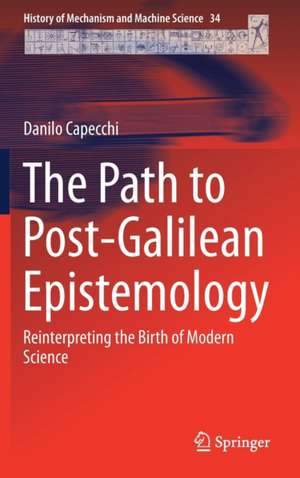The Path to Post-Galilean Epistemology: Reinterpreting the Birth of Modern Science: History of Mechanism and Machine Science, cartea 34
Autor Danilo Capecchien Limba Engleză Hardback – 18 iul 2017
| Toate formatele și edițiile | Preț | Express |
|---|---|---|
| Paperback (1) | 738.52 lei 6-8 săpt. | |
| Springer International Publishing – 4 aug 2018 | 738.52 lei 6-8 săpt. | |
| Hardback (1) | 1017.11 lei 6-8 săpt. | |
| Springer International Publishing – 18 iul 2017 | 1017.11 lei 6-8 săpt. |
Din seria History of Mechanism and Machine Science
- 15%
 Preț: 647.40 lei
Preț: 647.40 lei - 15%
 Preț: 666.73 lei
Preț: 666.73 lei - 18%
 Preț: 1018.55 lei
Preț: 1018.55 lei - 20%
 Preț: 752.94 lei
Preț: 752.94 lei - 18%
 Preț: 1002.61 lei
Preț: 1002.61 lei - 18%
 Preț: 950.52 lei
Preț: 950.52 lei - 18%
 Preț: 735.84 lei
Preț: 735.84 lei - 15%
 Preț: 649.54 lei
Preț: 649.54 lei - 15%
 Preț: 637.46 lei
Preț: 637.46 lei - 18%
 Preț: 1227.67 lei
Preț: 1227.67 lei - 15%
 Preț: 633.35 lei
Preț: 633.35 lei -
 Preț: 384.31 lei
Preț: 384.31 lei - 15%
 Preț: 655.92 lei
Preț: 655.92 lei -
 Preț: 389.70 lei
Preț: 389.70 lei - 15%
 Preț: 644.82 lei
Preț: 644.82 lei - 18%
 Preț: 954.45 lei
Preț: 954.45 lei -
 Preț: 442.13 lei
Preț: 442.13 lei - 20%
 Preț: 576.88 lei
Preț: 576.88 lei - 18%
 Preț: 944.19 lei
Preț: 944.19 lei - 24%
 Preț: 788.01 lei
Preț: 788.01 lei - 15%
 Preț: 647.73 lei
Preț: 647.73 lei - 15%
 Preț: 645.28 lei
Preț: 645.28 lei - 18%
 Preț: 963.60 lei
Preț: 963.60 lei - 18%
 Preț: 967.08 lei
Preț: 967.08 lei - 15%
 Preț: 645.28 lei
Preț: 645.28 lei -
 Preț: 399.29 lei
Preț: 399.29 lei - 15%
 Preț: 644.82 lei
Preț: 644.82 lei - 20%
 Preț: 594.05 lei
Preț: 594.05 lei - 15%
 Preț: 645.28 lei
Preț: 645.28 lei
Preț: 1017.11 lei
Preț vechi: 1240.39 lei
-18% Nou
Puncte Express: 1526
Preț estimativ în valută:
194.62€ • 212.07$ • 163.100£
194.62€ • 212.07$ • 163.100£
Carte tipărită la comandă
Livrare economică 23 aprilie-07 mai
Preluare comenzi: 021 569.72.76
Specificații
ISBN-13: 9783319583099
ISBN-10: 3319583093
Pagini: 543
Ilustrații: XIII, 533 p. 118 illus.
Dimensiuni: 155 x 235 mm
Greutate: 0.94 kg
Ediția:1st ed. 2018
Editura: Springer International Publishing
Colecția Springer
Seria History of Mechanism and Machine Science
Locul publicării:Cham, Switzerland
ISBN-10: 3319583093
Pagini: 543
Ilustrații: XIII, 533 p. 118 illus.
Dimensiuni: 155 x 235 mm
Greutate: 0.94 kg
Ediția:1st ed. 2018
Editura: Springer International Publishing
Colecția Springer
Seria History of Mechanism and Machine Science
Locul publicării:Cham, Switzerland
Cuprins
Ancient mixed mathematics.- Skills and mathematics in the Renaissance Italy.- New forms of natural philosophy and mixed mathematics.- Galilean epistemology.- Post-Galilean epistemology. Experimental physico-mathematica.- Concluding remarks.
Recenzii
“For those interested in a deep understanding of the changes in (applied) mathematics—as well as in natural philosophy—that occurred in the early modern era, the pleasant reading of the present book is certainly encouraged.” (Salvatore Esposito, Mathematical Reviews, March, 2018)
Notă biografică
Danilo Capecchi is Professor of Mechanics of Solids and History of Science at the University of Rome La Sapienza. His research into the history of science focuses mainly on classical mechanics.
Textul de pe ultima copertă
This book casts new light on the process that in the sixteenth and seventeenth centuries led to a profound transformation in the study of nature with the emergence of mechanistic philosophy, the new mixed mathematics, and the establishment of the experimental approach. It is argued that modern European science originated from Hellenistic mathematics not so much because of rediscovery of the latter but rather because its “applied” components, namely mechanics, optics, harmonics, and astronomy, and their methodologies continued to be transmitted throughout the Middle Ages without serious interruption. Furthermore, it is proposed that these “applied” components played a role in their entirety; thus, for example, “new” mechanics derived not only from “old” mechanics but also from harmonics, optics, and astronomy. Unlike other texts on the subject, the role of mathematicians is stressed over that of philosophers of nature and the focus is particularly on epistemological aspects. In exploring Galilean and post-Galilean epistemology, attention is paid to the contributions of Galileo’s disciples and also the impact of his enemies. The book will appeal to both historians of science and scientists.
Caracteristici
Proposes a new interpretation of the transformation in the study and philosophy of nature during the sixteenth and seventeenth centuries Stresses the role of mathematicians Explores Galilean and post-Galilean epistemology in depth
